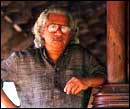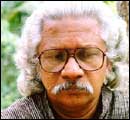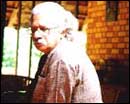'I am the creator and the critic'
Shobha Warrier
There are very few awards in the world that filmmaker Adoor Gopalakrishnan has not won.
 British Film Institute Awards, FIPRESCI prizes, awards at the Venice, Karlovy Vary, Toronto, etc, in addition to five best director awards at the national level.
British Film Institute Awards, FIPRESCI prizes, awards at the Venice, Karlovy Vary, Toronto, etc, in addition to five best director awards at the national level.
And there is not a single film of his that is not internationally acclaimed.
It has always been a pleasure to go to his beautiful house and talk to him. The first time I interviewed him was in 1983, when I started my career as a journalist.
His film,
Elippathayam, was making waves, both nationally and internationally.
In the last 17 years, I have lost count of the number of times I have interviewed him. But each time has been a revealing and informative experience. He has always had something new and different to tell me.
As we drive toards his house, I find that nothing much has changed after so many years. The paddy fields and trees are still there. Multi-storeyed houses have not encroached the area. We encountered only an occasional vehicle on the way.
It was as if we were going to a quiet and serene village. In fact, we almost were: it was a very quiet suburb of Trivandrum.
His house, built exactly like an old
nalukettu (a traditional Kerala house), still looks new and beautiful; the yards are swept clean of all dry leaves.
It was amidst these lush and tranquil surroundings that I embarked on yet another enlightening and stimulating tete-a-tete with the man himself. Excerpts:
Your last feature film, Kathapurushan was made in 1995.
You made a documentary on Kalamandalam Gopi last year, but you have made only a handful of films in the last 28 years. Why such big gaps between each film?

After I make a film, I spend a lot of my time going around the world talking about it and giving interviews! *laughs*
I am not joking when I say I have to talk a lot about every film of mine. For nearly two years, I go around talking about my film. I also participate in many debates.
These interactions are very important to me as a filmmaker.
Do you understand your film better when you interact with people and answer their questions? Or do you detach yourself from your film and talk?
Well, it's both. It is not possible to remain totally detached, as you are fully involved with the product. I think you have to be attached and detached at the same time because you are both the creator and the critic.
You show the film to an audience and, at the same time, you also watch the film.
When does the creator become the critic? After the film is made?
Both are within you all the time. Even before you make a film, you ask yourself constantly: Why should anybody come and watch your film?
As a creator, I have to sustain your interest in my film in what I am doing.
Generally, all foreign festivals have a question and answer session after the screening of the film. Many of them may not have a clue about how a person lives in Kerala, nor even the existence of the state. They may not have heard of a language called Malayalam.
So, their perspective will be totally different from a person who knows all about Kerala, its language and me.
The experiences of the characters in a film like Elippathayam or Kathapurushan must have been very alien to the foreigners?
No. I will tell you an interesting incident about Elippathayam.
When I made the film, I thought only a person from Kerala would be able to understand the film.
Recently, there was a tribute for me at Houston.
I was pleasantly surprised when the modernists there told me, "You portrayed our own experiences. We also feel like your character."
I received the same response from many viewers when the film was shown in London in 1982.
That means human emotions and behaviour are the same everywhere...
That's right. How else can a person who lives in a totally modern situation identify with a man who lives in a very rural area?
The only reason for such identification is the universality of human emotions.
 How do you take criticism? Are you open to criticism?
How do you take criticism? Are you open to criticism?
There are two types of criticism. One comes from those who are informed.
But the majority are uninformed about the medium called cinema. They feel that cinema, as an art form, is accessible to all. Yes, all those who go to a theatre, buy tickets and watch a film can have an opinion.
But the problem is, they feel their opinion is criticism. They feel they can critically evaluate a work.
These people might be right as far as the superficially made commercial ventures are concerned.
But there are a lot of complexities in my work. And only those who have seen several good films can comprehend those complexities and enjoy my work.
So they should understand the medium to enjoy the work? Do you mean they have to look at cinema as a work of art?
It is like reading a book.
Is there not a difference in reading a news report in a newspaper and a piece of literature?
A newspaper report may be superficial, it may titillate you, but you forget about it after some time.
On the other hand, you need some preparedness to read and enjoy a good literary work.
How do you face the criticism of these illiterate people? By illiterate, I mean, those who do not have much knowledge about cinema as a medium...
They have no right to criticise.
What they do is they give their opinion. They have all the freedom in the world to pass an opinion.
Every opinion does not become criticism. A critic's role is different.
Let me also say that some works go beyond the level of critics too.
Generally a critic takes common features from many other previous works and uses them as yardsticks. But these yardsticks are passť by the time a critic faces a new work.
So a critic should be able to see and understand new things in a work.
So, he has to be very open and knowledgeable...
Yes. But they (critics) are very rare to find. There are many such uninformed international critics, too.
A literary personality always reads a lot to keep abreast of what is happening in the world of literature. Similarly, do filmmakers see movies to update themselves? Do they have to?
Yes, a filmmaker has to watch films all the time. Just like a writer updates himself by reading, a
filmmaker also has to know what is happening in the world of cinema.
This is because this world is constantly changing. Whatever happens in real life, in the field of television, in the print media or even a hoarding can affect cinema.
So a filmmaker must be aware of what is happening around him as also what is happening in cinema.
How important is craft in a good film?
Very, very important. You may have good ideas, but if you do not have the craft to express yourself, your idea will fail. What you express is the content.
Is content the 'soul' of the film?
If content is the soul of the film, then craft is the body. Where will you place the soul if you don't have a body? More than that, the body should have the ability to project the soul.
Is technology important to craft?
I would say both are interlinked. Only if you are aware of the properties of a lens will you be able to decide which lens should be used for a particular situation.
If you leave that to the cameraman, the craft is not yours but the cameraman's.
Similarly, you -- the filmmaker -- should decide what sound is needed for a particular scene. If you leave that to the sound engineer, it becomes his craft.
 You are saying that a filmmaker should be an able technician, too?
You are saying that a filmmaker should be an able technician, too?
If a filmmaker is not a technician, he is not a filmmaker at all.
How do you tell a story? Through the medium of cinema. If you do not have any knowledge of the medium, you will not be able to tell the story or express yourself properly.
Coming back to the long gap between your films. You said you had to talk about your film and participate in debates.
Is that the only reason for the wide gap or are there other reasons?
Yes, there are many other reasons, too.
I can't bring myself to make another film immediately after I finish one because I live with the film for a long time. I take some time to come out of it.
And after I finish a film, I am exhausted.
You have made documentaries, too. What are the differences between making a feature film and a documentary?
A documentary is based on reality. We have a direct relationship with the theme. We do not concoct facts.
But in the case of feature films, you create a story; it is a piece of fiction.
Is there less creativity in documentaries?
Not at all. In fact, the definition of a documentary is the creative interpretation of reality.
Fiction is also creative interpretation of reality. But in fiction, you can concoct facts, which isn't the case with a documentary.
How challenging is it for a filmmaker to document real life?
It is not documentation in the real sense. We can be very inventive, too. We can find extraordinary
things from ordinary life.
It all depends on the approach of the filmmaker, the way he looks at the world and at life.
The personality of not only the person you are making the documentary on, but also the person who makes the documentary is exposed in the film.
You made your last feature film five years ago. When will you make your next feature film?
I've almost finished writing the script right now.
Why do you insist on writing your own script? Is it for the creative freedom that you enjoy as a writer and, later on, as a filmmaker?
I don't like to make a film based on the script of another writer.
Only I can write the script for my films.
It is easy to make a film based on somebody else's script. All you have to do is shoot the film.
If I had followed that, I would have made many films in the last 28 years. Many people want to make money while they can.
Is money not important to you?
Of course, it is very important. My wife will not feed me if I don't bring home the money! *laughs*
I am the highest paid person in my unit. I am very particular about that.
But I will never compromise for money. I want to enjoy my work and get pleasure out of my work.
Even if I don't have money, I will do only what I like to do.
I love filmmaking and that, too, certain kind of films, on my own terms. For the last few years, I have been making documentaries based on the performing arts and artistes.
You were born in a family that traditionally patronised and practised Kathakali. Is making documentaries on the performing arts a journey in search of your roots?
Yes, one can say that. You will be able to understand yourself better when you make such documentaries.
More than that, you can find a link between all these art forms. You also get a lot of inputs from these disciplines, not directly but indirectly, in a subtle way.
How important is it for a person to be in touch with his roots?
Extremely vital. Imagine a tree without roots! A tree will be healthier and stronger if its roots
have penetrated the soil and gone deep down.
We branch off into higher skies with stronger roots. I will do only what I like to do.